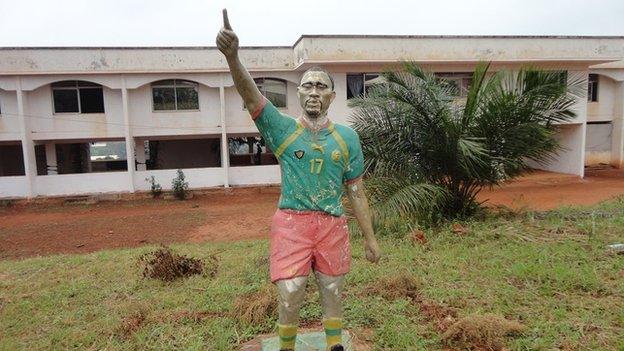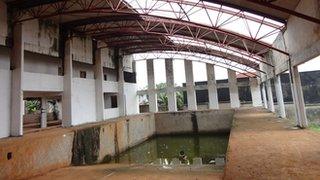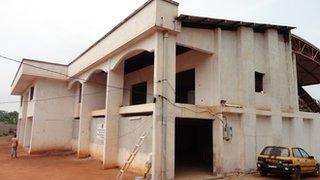Foe slowly being forgotten
- Published

While the 2013 Confederations Cup reaches the semi-finals stage in Brazil, on this day 10 years ago the tournament was struck by tragedy.
On 26 June 2003, Marc-Vivien Foe collapsed on the pitch while playing for Cameroon in their semi-final against Colombia and, despite attempts to resuscitate him, the 28-year-old died shortly after from a cardiac arrest.
A decade later, it is sad to learn that the memory of the former West Ham and Manchester City midfielder is beginning to fade in some quarters - and that an intended legacy is failing.
Ten years before his death, Foe had a dream of training young Cameroonians and African footballers.
He conceived the Marc-Vivien Foe Sport Complex, which was built on the outskirts of Yaoundé in Biteng.
It no longer reflects Marc's ambitions and hopes.
The statue at the entrance already has cracks, with the paint peeling off, and the building is falling into ruins. If nothing is done, one day it will be turned into a home for families to rent.

A swimming pool lies in disrepair at the Marc-Viven Foe Sport Complex
Today, the complex houses only a few people, the floor is dusty, there are no windows and doors, fungus is growing in some parts and the general atmosphere is one of abandonment.
Where there was supposed to be a swimming pool, there is a pool of dirty green water on which float a few rusty, dirty plastics and cans.
The playground behind is like many in Cameroon; hard ground, dug some years ago, and behind is a bush.
To stop thieves from removing the few things still left in the complex, Marc's father Sa Majeste Foe Amougou Martin has agreed to the installation of a police post.
"Marc would have constructed houses, he would have loved to help Cameroonians and Africans, but nobody has contributed to the project", he regrets.
Four years ago, there used to be a ceremony in memory of Marc at the complex with football matches played, but that is also a dying tradition.
This year, there is only a mass at the site of Marc's tomb to mark the anniversary of his passing.
A walk and a cycling race, some of the activities earmarked to commemorate Marc's life, have been postponed to 20-27 July due to the Gulf of Guinea Heads of State Maritime Summit.
There has been no official programme from the Cameroon government. Promises were made 10 years ago, but nothing has happened.
"Government is slow, it does not act fast and when promises are made like this, it takes time. I know something would be done but the government does not act fast," said a still-hopeful Amougou Foe.
"Ten years is like yesterday and we are still touched by Marc's death. As a father it is difficult to forget."
He casts back his mind to when Marc signed a contract with Manchester City.

Foe's building is not befitting of a good man and a talented footballer
"Marc told me about the deal but I did not know he was sending me money. I had FCFA 80,000 (US$160) in my account, but when I checked the account I saw additional FCFA 60m (US$200,000) . I checked again at another counter to be sure I hadn't made a mistake."
Without the finances it is difficult to maintain the sport complex and Amougou Foe is deeply concerned.
"Marc's worry was he would not finish this complex," he said. He wished to train the youths, but this is not happening. If the family, despite our little means, had stopped trying to keep up the complex, it would have been surrounded by bush and forest; it would have completely fallen into ruins."
It seems Cameroonian footballers, too, have never thought of doing something as a group in honour of 'Marco", as he was fondly called.
Amougou Foe thinks Cameroonian footballers could do something if they so wished because some have sports complexes out of Cameroon.
"If there could be someone to construct the football pitch, take youths and train there, it would be nice; my wish is for the complex to be alive," he said.
Present in the stadium that fateful day 10 years ago was Cameroonian goalkeeper Idriss Carlos Kameni, who remembers how it all happened.
"Marc was tired three to four days before the game and I think he was old enough to know if to play or not. When he fell the game continued and we were only told afterwards he had died," he said.
It was difficult for us to bear, even returning to Saint Etienne where we were lodged, but, until we saw the body we did not believe he had died.
"I remember him positively as a great man and he was like an elder brother to me and others - he was the leader of the national team".
When Marc, who was a father of four, fell in the stadium it took some time for the medical team to arrive and attempt to revive him.
"Today, with current technology, there is a lot of swiftness in intervention and if his case came after others, he would have still been living", Kameni said.
"We lost a great man, he was always present, a reference for youths and always showed a good example."